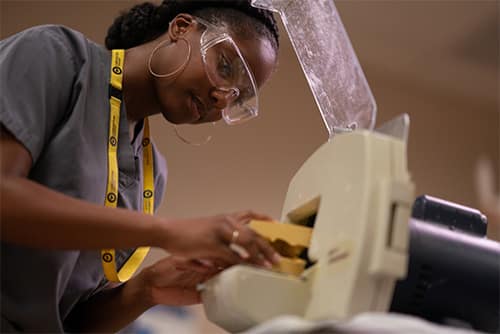 In the clinical setting, the dental assistant plays a pivotal role. They are there to provide the dentist with full support during their procedures, often giving them the tools that they need to complete the task at hand. In many cases, they also are there to affirm the dentist’s choices and reassure the patients that everything is moving forward smoothly.
In the clinical setting, the dental assistant plays a pivotal role. They are there to provide the dentist with full support during their procedures, often giving them the tools that they need to complete the task at hand. In many cases, they also are there to affirm the dentist’s choices and reassure the patients that everything is moving forward smoothly.
Any dental assistant will tell you that they have a great position in dentistry. Not only do they get to be involved in the procedural work that is being performed, but they also get to play an active role in patient care and comfort.
If you think that becoming a dental assistant may be the best step forward for you, then now is the right time to learn about the dental assistant requirements.
What Does a Dental Assistant Do?
A dental assistant plays a versatile and critical role in any dental office, with job responsibilities ranging from administrative tasks to patient care. According to Betterteam, The responsibilities of a dental assistant can include:
- Scheduling patient appointments and managing office tasks.
- Preparing patients for dental procedures.
- Providing patients with detailed information about upcoming procedures.
- Providing patients with accurate information about oral hygiene.
- Assisting the dentist during dental care procedures.
- Taking X-rays of patients’ teeth and gums when required.
- Offering reassurance and comfort to patients who are undergoing dental care procedures.
- Preparing dental equipment, including sanitizing tools before and after the procedures.
- Maintaining dental supply inventory for the dental office.
Demand and Job Outlook for Dental Assistants
Generally speaking, the job outlook is positive for dental assistants. This can be attributed to the fact that the public is becoming more aware of the connections between good oral hygiene and long-term health.
How Long Does It Take to Become a Dental Assistant?
The time that it takes you to earn your certificate may vary, based on the amount of time that you can currently commit to coursework. Earning a Dental Assisting certificate from Carrington College can take as little as 9 months depending on your personal availability.
How to Become a Dental Assistant
If you are looking to begin a career in the dentistry field, it’s important to have a full understanding of the dental assistant.
Education
Dental assistants can go through schooling to receive their education, and in some circumstances, you can get on-the-job training in the dental office. You can choose to complete a Dental Assisting certificate if that’s the best option for you.
Training
Once you have completed an educational program to prepare you for a dental assistant position, you are able to apply for open job postings in this field. However, work experience in healthcare or in a dental office can help you as you search for the best possible job in your area.
Having an externship under your belt can help you landing your first job. The experience gained in that setting will give you more confidence in your abilities as a dental assistant.
Importance of Ongoing Professional Development for DAs
Once you have earned your certificate and secured a position as a dental assistant, you should to continue to prioritize your training and education. The dentistry field is a dynamic industry, and there are always new developments that dental assistants must be aware of. According to Dentistry IQ, You should continue to complete training courses and educational programs related to new technology, advanced dental procedures, updated patient care techniques and more, ensuring that you can remain competitive in this field.
Tips for Becoming a Dental Assistant
Having the ability to work closely with patients and play an integral role in the dental office setting is a dream come true for many professionals who want to be a part of the dentistry field. These tips will help you get on the fast track toward becoming a dental assistant.
Obtain Education and Training
The first step toward becoming a dental assistant is to pursue an education that will provide you with the information you need to know about daily life in this role. Dental assistants can complete some type of postsecondary program, ranging from a certificate to a degree program. Generally speaking, a certificate program is going to be a shorter, more cost-effective option that will get you into the dental office sooner.
Gain Practical Experience
Practical experience in the dental office setting will help you have a better understanding of the skills required to be successful in this position. As you are pursuing your Dental Assisting certificate, you may want to consider getting a job in a dental office that allows you to start accruing professional experience. For example, you could apply to part-time jobs working the front desk of a dental office in order to learn more about the technology used at these offices, the best scheduling practices and the skills required to work effectively with patients.
Be Proactive
Rather than taking a passive approach to your career outlook, take matters into your own hands. As you start to pursue your certificate in Dental Assisting, you can begin reaching out to local dental offices and building your professional network. You can also be proactive by:
- Attending networking events in your local area.
- Reaching out to contacts that you have in the healthcare and dental fields.
- Setting up practice interviews to prepare for your job search.
Develop an Understanding of Dental Office Operations
When you are working as a dental assistant, you will be a jack of all trades. There are few other positions in the dental office that are involved in so many aspects of daily operations, so it’s important that you develop an in-depth understanding of routine office practices. You can do this by securing a job at a dental office, such as an administrative assistant position, or by reaching out to local practices to learn more about what they do and why they do it that way.
Ask for Feedback
Asking for feedback from your peers, your instructors and your colleagues is a sign that you are ready and willing to learn. The constructive feedback that you receive will help you recognize your strengths and develop a plan to improve when necessary. In the dental assisting industry, you will constantly be learning, growing and adapting to new procedures and practices, so it’s important to be able to ask for and accept feedback along the way.
Have Strong Communication Skills
You will need to be confident and poised when speaking to your professional colleagues, the dentist that you are partnering with and the patients that you are caring for. Effective communication is necessary for relaying information about treatment, scheduling patients and working with the dentist during procedures.
Always Show Professionalism
Professionalism is the key to success in the dental assisting field, as you will be required to know how to act and behave when in front of the dentist as well as the patients. Remaining composed, providing compassionate care and relaying accurate information are vital aspects of this position.
How to Choose the Right Dental Assisting Program
The Dental Assisting Certificate of Achievement program at Carrington College is a skills-based program designed to prepare you for the practical aspects of this career field. We offer an insightful, skills-based program at our locations that will provide you with the professional experience as well as the knowledge you require to begin this next chapter of your life.
Carrington College is accredited by the Accrediting Commission for Community and Junior Colleges, 428 J Street, Suite 400, Sacramento, CA 95814; 415 506 0234 an institutional accrediting body recognized by the Council for Higher Education Accreditation and the U.S. Department of Education. Additional information about accreditation, including the filing of complaints against member institutions, can be found at www.accjc.org/.
Request more information about our Dental Assisting program today, and visit our Student Consumer Information page for important information on program outcomes.



